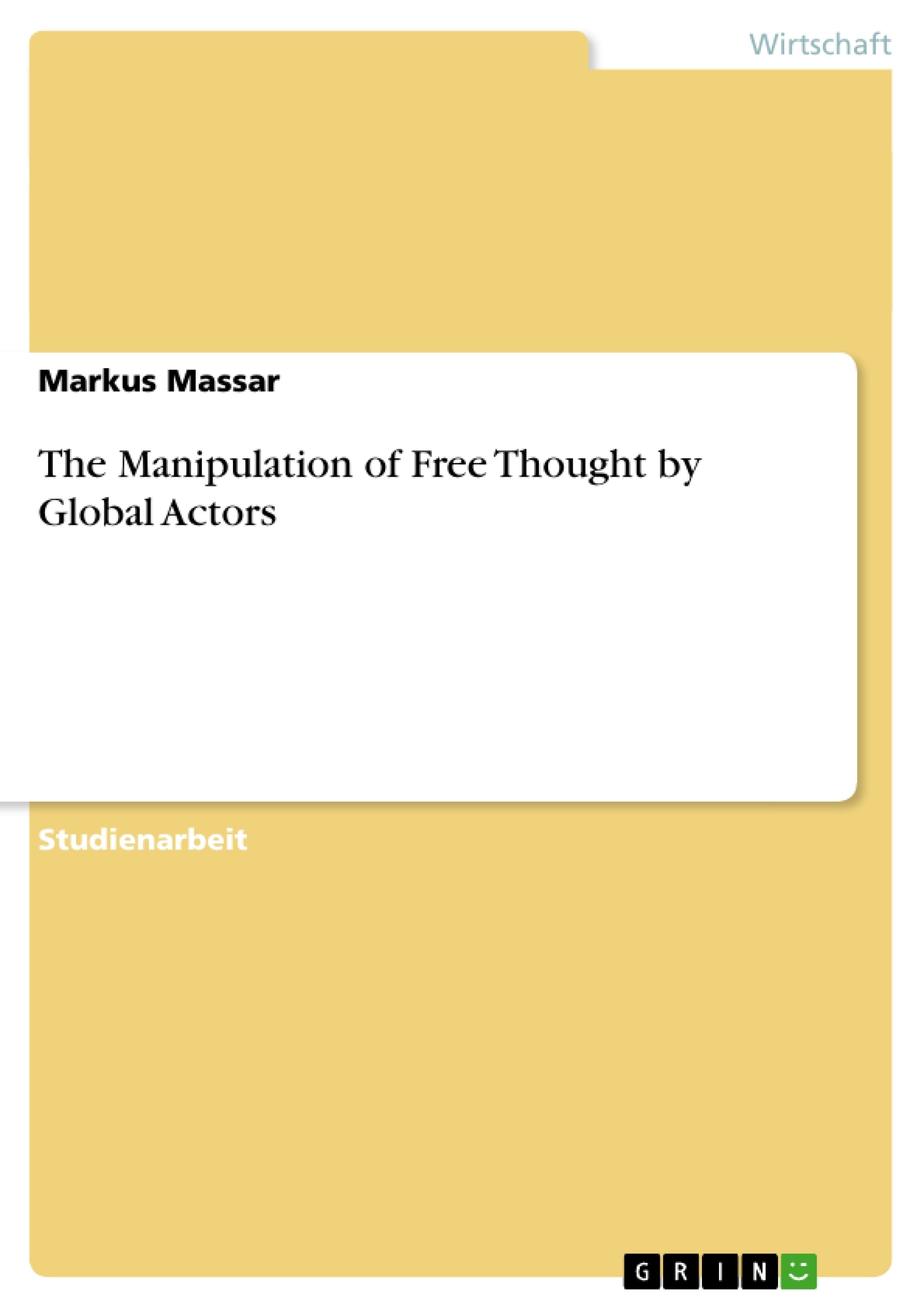One of the most stated issues in news headlines in recent months was the offence of the United States of America against Iraq. People all over the world followed the history of mistrust and suspiciousness against the Arabic nation by member states of the United Nations′ Security Council on television. No accusation has been proven by the United States down to the present day. But how comes that the larger part of the world stepped onto the side of the United States and supported war without a clear reason? This term paper is concerned with the effects of globalization on democratic values, the interrelation of politics and mass media, and the consequences on media′s function as independent arbitrator and on any individual′s freedom of thought. The aim of my term paper is to analyze the mechanisms in force which lead to readymade judgements for the majority of the population in Western societies. To proof my thesis I will carry out herein that the opinion of the world population is being manipulated backdoor by the foreign policy makers of the United States for the compliance with their values.
Hence I provide the reader with an overview of the drivers of globalization and the subsequent development of international forces out of reach of democratic decision at the grass-roots level. The supremacy of Western oriented values within these global powers is highlighted. Then the news flow throughtout the world is discussed in detail and the roles of the media for society and its influence on the individual are presented. Human behaviour is evaluated in sociological terms. To conclude my term paper the relation between politics and media in conflict reporting is considered under a twofold model of secrecy versus domestic support.
Inhaltsverzeichnis
- 1. INTRODUCTION.
- 2. THE GLOBAL DOMINATION OF WESTERN VALUES
- 2.1. MAIN DRIVERS OF GLOBALISATION: TECHNOLOGY AND ECONOMY.
- 2.2. THE RISE OF NEW GLOBAL FORCES
- 2.3. THE IMBALANCE OF GLOBAL POWER.
- 3. THE FLOW OF NEWS AROUND THE WORLD.
- 3.1. THE MEDIA AGENTS: NEWS GATHERING AND EDITING.
- 3.1.1. News Credibility Supporting Instruments.
- 3.1.2. The Design and Formation of News.
- 3.1.3. Cultural Relativistic News Gathering: Correspondents.
- 3.2. THE MEDIA INDUSTRY: NEWS DISSEMINATION
- 3.3. THE MEDIA SOCIETY: INFORMATIONAL AND EDUCATIONAL NEWS.
- 3.4. THE MEDIA AND THE INDIVIDUAL.
- 3.4.1. Cultural Relativism in the Media.
- 3.4.2. Ethnocentrism in a Global World beyond Personal Experience
- 3.4.3. The Mechanisms of Cognitive Processing.
- 4. THE INTERRELATION OF POLITICS AND MASS MEDIA.
- 4.1. THE EQUILIBRIUM MODEL & ITS MEANING FOR CONFLICT SITUATIONS.
- 4.2. THE MUTUAL INFLUENCE OF POLITICS AND THE MEDIA.
Zielsetzung und Themenschwerpunkte
Die vorliegende Hausarbeit befasst sich mit den Auswirkungen der Globalisierung auf demokratische Werte, der Verflechtung von Politik und Massenmedien sowie den Folgen für die Funktion der Medien als unabhängiger Vermittler und die Freiheit des Denkens jedes Einzelnen.
- Analyse der Mechanismen, die zu vorgefertigten Urteilen bei der Mehrheit der Bevölkerung in westlichen Gesellschaften führen.
- Beweise für die Manipulation der Weltbevölkerung durch die außenpolitischen Entscheidungsträger der Vereinigten Staaten, um deren Werte zu erzwingen.
- Überblick über die Treiber der Globalisierung und die daraus resultierende Entwicklung internationaler Kräfte, die außerhalb der demokratischen Entscheidungsfindung auf der Graswurzelebene liegen.
- Hervorhebung der Vorherrschaft westlich orientierter Werte innerhalb dieser globalen Mächte.
- Detaillierte Untersuchung des Nachrichtenflusses weltweit und Darstellung der Rolle der Medien für die Gesellschaft und deren Einfluss auf den Einzelnen.
Zusammenfassung der Kapitel
Das erste Kapitel befasst sich mit der Einführung in das Thema, indem es den Konflikt zwischen den Vereinigten Staaten und dem Irak als Beispiel für die Manipulation von Meinungen durch die Medien heranzieht. Die Arbeit untersucht die Mechanismen, die zu vorgefertigten Urteilen bei der Mehrheit der Bevölkerung in westlichen Gesellschaften führen.
Im zweiten Kapitel wird die globale Dominanz westlicher Werte beleuchtet. Die Arbeit untersucht die Rolle der Technologie und Wirtschaft als Treiber der Globalisierung, den Aufstieg neuer globaler Kräfte und das Machtdefizit von Nationalstaaten. Es wird gezeigt, dass die Globalisierung auch zur westlichen Dominanz in internationalen Organisationen beiträgt.
Das dritte Kapitel analysiert den Nachrichtenfluss weltweit. Es werden die Medienagenten, die Nachrichtengewinnung und -bearbeitung sowie die Rolle der Medienindustrie und -gesellschaft diskutiert. Das Kapitel untersucht auch den Einfluss der Medien auf den Einzelnen und analysiert die kognitiven Mechanismen der Nachrichtenverarbeitung.
Das vierte Kapitel betrachtet die Interrelation von Politik und Massenmedien. Es wird das Gleichgewichtsmodell und dessen Bedeutung für Konfliktsituationen sowie der wechselseitige Einfluss von Politik und Medien untersucht.
Schlüsselwörter
Globalisierung, Medien, Politik, Nachrichten, Werte, Dominanz, Manipulation, Demokratie, Technologie, Wirtschaft, Kultur, Gesellschaft, Individuum, Konflikt, Gleichgewicht, Information, Bildung, ethnozentrisch, kulturell-relativistisch.
Häufig gestellte Fragen
Wie beeinflusst die Globalisierung die Freiheit des Denkens?
Die Arbeit untersucht, wie globale Akteure und Massenmedien Meinungen manipulieren und die Unabhängigkeit der Information gefährden.
Welche Rolle spielen die USA in der Meinungsmanipulation laut dieser Arbeit?
Es wird die These aufgestellt, dass die US-Außenpolitik Medien nutzt, um westliche Werte weltweit durchzusetzen und Unterstützung für Konflikte wie den Irak-Krieg zu generieren.
Was sind die Haupttreiber der Globalisierung in diesem Kontext?
Technologie und Wirtschaft werden als primäre Treiber identifiziert, die internationale Kräfte außerhalb demokratischer Kontrolle stärken.
Wie funktionieren Nachrichtenagenturen als "Medienagenten"?
Die Arbeit analysiert die Gewinnung, Bearbeitung und Gestaltung von News sowie die Mechanismen der kognitiven Verarbeitung beim Einzelnen.
Was bedeutet "Ethnozentrismus" in einer globalisierten Welt?
Es beschreibt die Tendenz, Informationen aus einer rein westlichen Perspektive wahrzunehmen, was über die persönliche Erfahrung hinausgeht.
- Quote paper
- Markus Massar (Author), 2003, The Manipulation of Free Thought by Global Actors, Munich, GRIN Verlag, https://www.grin.com/document/29291



